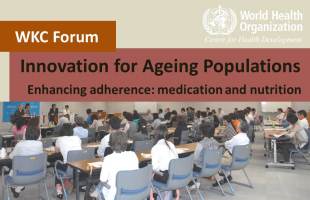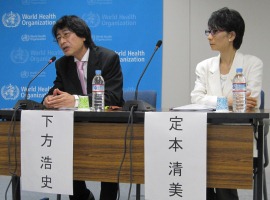WKC Forum report: Innovation for Ageing Populations – Enhancing adherence: medication and nutrition

The United Nations' International Day of Older Persons is celebrated every year on 1 October. In commemoration of this year's International Day of Older Persons, the WHO Centre for Health Development (WHO Kobe Centre – WKC) will organize in Kobe an open forum on “Innovation for Ageing Populations – Enhancing adherence: medication and nutrition”. 60 participants were in attendance to learn about the latest innovations for older populations to improve medical adherence and the well-being of elderly patients; and the useful nutrition insight for older adults.
The population of older adults worldwide is growing rapidly. This demographic transition has also ushered forth an epidemiological transition. Noncommunicable diseases (NCDs) have become the leading cause of death globally, and account for 50% of all disability. Japan is particularly emblematic of this trend, having the largest proportionate population of older adults in the world, and where NCD accounts for nearly 80% of all mortality.
 Living longer will entail that many of us will have to live with conditions requiring medication and nutrition regimen. In this context, a patient’s therapeutic behaviours used to be judged passively based on the concept of “compliance” – how closely a patient follows the treatment prescribed by a doctor. Today, more important to supporting treatment success depends on the extent to which a person’s behaviour – taking medication, following a diet, and/or executing lifestyle changes – corresponds with agreed recommendations from a health care provider. This is the concept of “adherence”.
Living longer will entail that many of us will have to live with conditions requiring medication and nutrition regimen. In this context, a patient’s therapeutic behaviours used to be judged passively based on the concept of “compliance” – how closely a patient follows the treatment prescribed by a doctor. Today, more important to supporting treatment success depends on the extent to which a person’s behaviour – taking medication, following a diet, and/or executing lifestyle changes – corresponds with agreed recommendations from a health care provider. This is the concept of “adherence”.Many of the health challenges that manifest with ageing can be prevented and/or controlled. However, adherence to treatment becomes more challenging with age, cognitive and functional decline and with the increasing complexity of medical regimens to maintain health and quality of life. Adherence to therapies is a primary determinant of treatment success. Poor adherence attenuates optimum clinical benefits and therefore reduces the overall effectiveness of health systems.
Similarly, as people age, their nutritional requirements evolve and may be impaired by ill-health, side effects of multiple medication, changing lifestyles and lack of knowledge. Linkages between diets, medical adherence and improved health condition emerge as important elements of healthy ageing.
 At this forum, four Japanese experts in the field of gerontology, medication, and nutrition, presented their respective evidence-based body of work and strategic recommendations in moving forward on addressing current and emerging challenges on medical adherence and nutrition in ageing populations.
At this forum, four Japanese experts in the field of gerontology, medication, and nutrition, presented their respective evidence-based body of work and strategic recommendations in moving forward on addressing current and emerging challenges on medical adherence and nutrition in ageing populations.
Dr Oda, Professor Emeritus of Kobe University, focused on defining the concept of adherence and highlighted the changing perceived and expected roles of older people in Japan. Dr Sadamoto, Professor at the Yokohama College of Pharmacy, presented the findings of her latest research on monitoring patient’s drug adherence with innovative technologies. Dr Shimokata, Professor at Nagoya University of Arts and Sciences, focused on the need for older people to improve dietary habits as a way to improve well-being. Dr Kimura, Research Fellow at Kyoto University, presented on declining food diversity in older people and the challenges it creates for older people coping with chronic diseases.
The panel discussion was lively led by Dr Oda with the speakers, and motivated by comments and questions from the participants. The discussion primarily covered main topics focusing on medical adherence as well as nutrition requirements for the elderly. To improve and enhance adherence, the discussion concluded that there is an urgent need to increase collaboration across sectors (e.g. doctors, nurses, pharmacists, nutritionists, community support, etc.) for better responding the current and emerging needs of older adults.

Programme & Speakers
Presentations (Japanese)
- “Medical and nutritional adherence: Wellbeing of the elderly in Japan”
Dr Toshikatsu Oda, Professor Emeritus, Kobe University Kobe
- “Innovations in monitoring medical adherence in elderly patients in Japan”
Dr Kiyomi Sadamoto, Professor, Department of Clinical Pharmacy
Yokohama College of Pharmacy
- “Nutrition and health maintenance in Japanese elderly”
Dr Hiroshi Shimokata, Professor, Graduate School of Nutritional Sciences
Nagoya University of Arts and Sciences
- “Adequate dietary intake in later life”
Dr Yumi Kimura, Post-Doctoral Research Fellow of the Japan Society of the Promotion of Science
Center for Southeast Asian Studies (CSEAS), Kyoto University

